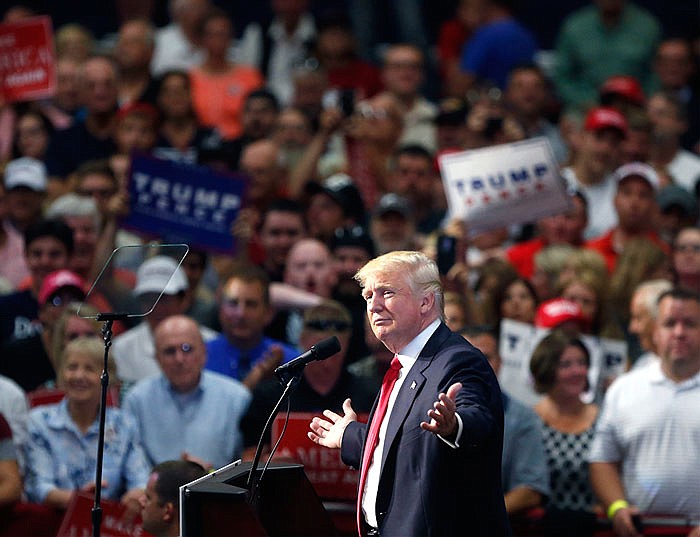AKRON, Ohio (AP) - Republican Donald Trump promised Monday to be "fair, but firm" toward the estimated 11 million immigrants living in the United States illegally, a shift in tone that raised questions on whether he's backtracking from previous pledges to push for mass deportations.
The billionaire businessman, whose hard-line approach to immigration and fierce rhetoric propelled him to the GOP presidential nomination, insisted that he's not "flip-flopping" on the divisive issue as he works to broaden his support two-and-a-half months before the general election.
But in a meeting with Hispanic activists Saturday, Trump indicated he was open to considering allowing those who have not committed crimes, beyond their immigration offenses, to obtain some form of legal status - though attendees stressed Trump has yet to make up his mind.
"The impression I got was that the campaign is working on substantive policy to help the undocumented that are here, including some type of status so they would not be deported," said Pastor Mario Bramnick, president of the Hispanic Israel Leadership Coalition, who was in attendance.
Any walk-back would mark a dramatic reversal for Trump. During the GOP primary, Trump vowed to use a "deportation force" to round up and deport the millions of people living in the country illegally - a proposal that excited many of his core supporters, but alienated Hispanic voters who could be pivotal in key states.
Trump said in an interview with "Fox & Friends" on Monday that he was "working with a lot of people in the Hispanic community to try and come up with an answer."
"We want to come up with a really fair, but firm answer. It has to be very firm. But we want to come up with something fair," he said.
Later, he told Fox News Channel's Bill O'Reilly, "I just want to follow the law."
"The first thing we're gonna do, if and when I win, is we're gonna get rid of all of the bad ones. We've got gang members, we have killers, we have a lot of bad people that have to get out of this country. We're gonna get them out," he said.
"As far as everybody else, we're going to go through the process," he said, citing the policies of President Barack Obama and former President George W. Bush as examples.
Asked whether Trump's plan still included a deportation force, his new campaign manager, Kellyanne Conway, said Sunday it was "to be determined."
"Even Sen. Jeff Sessions," a hard-liner on immigration, "he doesn't deport 11 million people in his plan," Conway said on CNBC Monday.
Trump had been scheduled to deliver a speech on the topic Thursday in Colorado, but has postponed it.
There have been signs for weeks now that Trump was shifting course. Hispanic business and religious leaders who would like to see Trump move in a more inclusive direction have reported closed-door conversations with Trump in which they say he has signaled possibly embracing a less punitive immigration policy that focuses on "compassion" along with the rule of law.
At last month's GOP convention, the Republican National Committee's director of Hispanic communications, Helen Aguirre Ferre, told reporters at a Spanish-language briefing that Trump had already said he "will not do massive deportations" - despite the fact that Trump had never said so publicly.
Instead, Aguirre Ferre said, "he will focus on removing the violent undocumented who have criminal records and live in the country."
Indeed, Trump's first television ad of the general election specifically singles out illegal immigrants with criminal records, claiming that, if Clinton is elected, "Illegal immigrants convicted of committing crimes get to stay."
Trump's campaign has pushed back on the notion that he's reversing course. "Mr. Trump said nothing today that he hasn't said many times before, including in his convention speech," rapid response director Steven Cheung said after the meeting.

